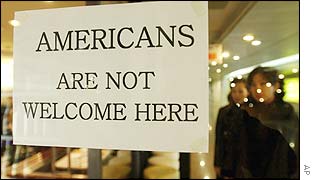Our ‘Dynamic’ Partner: This Pig Won’t Wear Pearls
With the news that Rep. Henry Hyde, R. Ill., Chairman of the House International Relations Committee, will soon retire, the race for succession appears to have begun in earnest.
Two of the names most frequently mentioned as successors are those of Republican congressmen Dana Rohrabacher of California and Dan Burton of Illinois. Other candidates include Republican Reps. Jim Leach of Iowa, Chris Smith of New Jersey, Ed Royce of California, and Ileana Ros-Lehtinen of Florida. With the exception of Burton, all have been outspoken on North Korean human rights issues–Leach and Royce deserve special mention–although Burton was a ferocious opponent of the Agreed Framework. Leach probably has the most “moderate” reputation on foreign policy, which could harm his chances, although he is particularly fortunate in his exceptionally bright staff. This excerpt from the leaked Nelson Report adds further insight:
All three [staffers for different Committee members] are determined to pursue balance and not to over-focus on emotional human rights and “commie bashing” . .
.
Chris . . . you say “commie bashing” and “human rights” like they’re bad things . . .
. . . activities which Committee chair Henry Hyde is occasionally prone to, but which form the principal focus of Rep. Dan Burton and Rep. Dana Rorabacher [sic] . . . . There is at least some possibility that either Burton or Rorabacher might get themselves selected as Chairman succeeding Hyde…a terrifying prospect to serious foreign policy players.
Burton may have lost himself a few votes over this, if you trust Wonkette’s sources. Chris Smith, despite his reputation for exceptional integrity, is also a long-shot: his disagreement with Tom Delay over veterans’ funding cost him his chairmanship of the Veterans’ Affairs Committee, as well as his committee seat (ouch!). Leach has the seniority, the staff, and the reputation, and he’s been angling for the chairmanship for some time. He’s a strong candidate for the job, and his focus on Asian-Pacific issues is probably good news for Korea policy.
We are thus left with some context for the following curious front-pager from Wednesday’s Chosun Ilbo, describing “a rare glimpse of pro-Korean sentiment in a Congress whose prominent voices have recently expressed open distrust and anger at Seoul, with International Relations Committee chairman Henry Hyde and East Asia and Pacific Subcommittee chairman Jim Leach in the forefront.” Some background on the rarity of that sentiment here. And which voice? None other than commie-bashing Dan Burton, who must have concluded that he needs a few friends:
Korea was the seventh largest market for U.S. exports, the fifth largest market for U.S. agricultural goods, a leading free-trade-agreement (FTA) candidate, the third largest contributor of troops to Iraq behind the U.S. and Great Britain, . . .
OK, if that part didn’t make you retch, this certainly will:
. . . and a nation that has been active on North Korean human rights by accepting some 7,000 defectors from the Stalinist country, Burton wrote.
To paraphrase another authority on the subject, this pig won’t wear pearls. In fact, South Korea’s policy of stiff-arming people who are clearly refugees, a classification that a U.N. Special Rapporteur recently confirmed, probably violates the U.N. Convention on Refugees, putting South Korea in the shameful company of China.
It was also a U.S. military ally where 33,000 U.S. troops are stationed and a friend that has fought on the American side in all four major conflicts it fought since the Korean War, and a major success story of post-World War II U.S. foreign policy, he added. Burton called the relationship with Korea one of America’s “most important and dynamic” partnerships, politically, militarily and economically, and said Seoul was still the most important strategic partner in East Asia. He said the U.S. must realize that Korea is a necessary and indispensable partner in promoting democracy and the free-market economy. The letter sent by Burton, who serves his 12th term, was a “Dear Colleague Letter” often used to get lawmakers’ attention on particular matters and sent to all 435 lawmakers in the lower house.
Maybe in your universe, Dan, but not the one the rest of us live in.
Now, I have nothing against public diplomacy, on the one hand. But on the other hand, many of Burton’s statements can’t pass the laugh test, starting with the suggestion that Korea is a guardian of human rights for North Koreans, and proceeding onward to the description of Korea as a staunch U.S. ally. I mean, have another thousand words, on me:

How long will I keep flogging this picture? Until the South Korean government sics the Human Rights Commission on these people, or until our troops are back at home. For now, this sort of treatment of U.S. soldiers in Korea–the ones protecting Korea’s freedom and prosperity–is both de facto legal and common. I searched far and wide for evidence that incidents like these resulted in serious punishment or any other forceful official discouragement, and came up with nothing (my visitors’ log shows regular visits from the Korean Embassy; maybe someone there can correct the record).
Now that we’ve safely excluded underlying objective truth as a basis for Burton saying these things, you’re left with other conclusions about why he said them. Does a member of the United States Congress feel a need to curry the favor of foreign powers to get a committee chairmanship? If Burton becomes chairman, will he help hold South Korea’s government accountable for this kind of conduct?
Or is this another case of South Korea’s influence machine rolling onward?